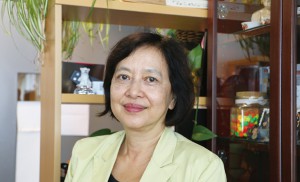Results showed that only half of the respondents say they intended to marry in the future, whereas a 2011 poll by the Family Planning Association of Hong Kong found nearly 60 per cent of respondents aged between 18 and 27 said they were intent on marriage.

Varsity’s poll also shows that only 47 per cent of respondents are willing to have children in the future. Among those who do want children, most would prefer to do so before they are 30. Nearly half of the respondents agreed the current political situation in Hong Kong has made them less willing to have children. In the Family Planning Association’s 2011 survey of 1,223 people aged between 18 and 27 nearly 60 per cent of young people said they planned to have children.
While fewer young people seem to be keen on getting married and having children, they attached great importance to friends. Half of the respondents thought family and friends were equally important, while nearly 60 per cent of the respondents accepted non-monogamous open relationships.
The survey suggests young people have a broader concept of how a family can be formed which is less restricted to those related by blood and living under the same roof. This reflects the view of 20-year-old Fiona Chow Tze-ching. “If intimate friends [give me enough emotional support], they can be [my family] too,” says Chow. “Getting along well and having mutual understanding is crucial…family love might occur among some of my closest friends.”
Chow also supports the idea of open relationships – namely having multiple relationships at the same time. She thinks the feeling of intimacy and “living in the moment” overrides the traditional value of commitment within a family. To her, it is the degree of emotional support and intimacy between people that is most important. She believes the more effort you put into a relationship, the more intimacy you feel and the more likely it is that you will regard the other person as a family member.

Elaine Au Liu Suk-ching, associate professor of the Department of Applied Social Sciences at the College of Liberal Arts and Social Science at the City University of Hong Kong has conducted extensive research on youth and their relationship with their families. She says the idea of family has evolved over time and the traditional concept of family currently faces an onslaught of challenges. Increased peer influence and the higher level of education among this generation of young people add to the pressure for a more open and fluid concept of family, says Au.
“Society has been more open for discussion on these issues [on the changing concept of family]…when I was at primary school, if my classmates’ parents got a divorce, it was somehow a taboo to tell. And now it is open [for divorced couples] to tell people about it.”
How people think a family can be formed has also changed radically. “For example, when people talk about the definition and nature of family in the United States these days, those who are unmarried and live by themselves would disagree that they do not have a family. They would argue that they have pets as well as friends, who they feel intimate with. They feel like they have a home. It is therefore no longer appropriate to say that these people do not have a family.”
She also sees many possible family formations – between two men or two women, or even between a man and an object such as a piece of furniture as long as there is an intimate emotional bond there. “Who knows what will be next?” she muses.
So, will the traditional concept of family breakdown in the face of these multiple interpretations of family? Au believes every development in the concept of family – be it pre-marital pregnancy, open relationships or even friends as family – does not change the fundamental basis of family, which is living collectively for survival.
“Our ancestors decided to live collectively, not individually, by forming families. We have lived collectively for survival throughout centuries. That will not be replaced over time.” Every young generation introduces new ideas and behaviour to the notion of family but Au believes that, for now, intimate emotional ties will continue to be the most important factor for this generation of young people in forming their own families in the future.
Edited by Thomas Chan







































